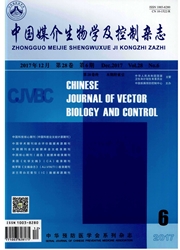

 中文摘要:
中文摘要:
蚊虫是重要的虫媒疾病传播媒介,可传播多种疾病,如疟疾、登革热等,严重危害人类健康。媒介蚊虫的防治是控制此类传染病的重要措施。蚊虫依赖天然免疫系统抵御疟原虫、真菌、病毒等外源病原体的侵染。蚊虫免疫主要分为体液免疫和细胞免疫。补体识别激活系统、免疫信号通路、黑化反应和活性氧等途径均参与了对病原体的免疫反应。现就媒介蚊虫抵御疟原虫和真菌等病原体免疫应答机制的最新进展进行综述。这将为发展新的蚊虫控制策略提供理论支持。
 英文摘要:
英文摘要:
As an important vector for insect-borne diseases, mosquitoes transmit viral encephalitis, dengue, malaria, filariasis and others and cause great concern to human health. The prevention and control of mosquito vectors is an important measure for controlling these infectious diseases. Mosquitoes have developed innate immunity against pathogens such as viruses, fungi and parasites. The immunity of mosquitoes is mainly classified into humoral immunity and cellular immunity. Complement recognition and activation system, immune signaling pathways, melanization, reactive oxygen species, etc. are involved in the immune response to pathogens. This paper reviews the recent research progress in the immune response mechanism against pathogens such as malaria parasites and fungi in mosquito vectors, which will provide theoretical support for developing new mosquito control strategies.
 同期刊论文项目
同期刊论文项目
 同项目期刊论文
同项目期刊论文
 期刊信息
期刊信息
